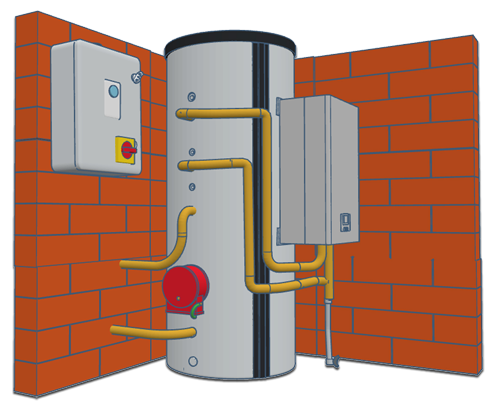The next generation FUSION range from hot water specialists Adveco is a complete range of packaged electric and packaged renewable electric water heaters for commercial projects. FUSION is a modern, future-proof system that embraces electric water heating and the option to incorporate air source heat pumps (ASHP) to lower carbon emissions in line with government calls for net zero.
As an all-electric system, it uses familiar technology that is relatively simple and quick to install, cost-effective and reduces carbon emissions. With an increased heating capacity over first generation Adveco FUSION systems of up to 34 kW, the next generation of FUSION systems offers greater versatility for meeting domestic hot water (DHW) demands across a range of commercial properties. Projects with small to medium basin and sink-led hot water demands – such as cafes, restaurants offices or gyms – taller buildings with basement plant rooms and organisations that depend on 24/7 hot water provision for continuity of service all gain advantages from using FUSION.
The packaged format enables flexibility to specify from a range of cylinders, primary electrical heating, air source heat pumps for pre-heat, and immersions for back-up all supported by Adveco’s bespoke controls to ensure optimal, efficient operation.

FUSION cylinders (ATSI & ATST) come with dedicated mounting points for the ARDENT electric boiler, simplifying and reducing the chance of installation errors. By mounting the electric boiler directly to the cylinder FUSION is a more compact, space-saving option when specifying or having to refurbish an existing plant room. The cylinder connections and clean-out plate are all arranged on the front of the tank for easy access when connecting pre-built pipework with a choice of left- or right-hand side connection, and for regular maintenance. This arrangement also enables FUSION to be situated tightly into a corner, again maximising available space.
The use of the 9, 12 or 24 kW ARDENT electric boiler replaces the use of a single immersion for primary heating. ARDENT, with multiple immersions inside its sealed storage tank provides automatically balanced usage to prolong system life. The typical cause of immersion failure is the creation of limescale in hard water areas, production of which is accelerated by the higher heat intensity of electrical water heating. This is avoided in FUSION, as the ARDENT is used in a sealed ‘primary’ loop to an indirect coil in the system’s cylinder. The ARDENT electric boiler heats the same water continuously so there is only a small, finite amount of scale in the system which will not damage the elements, effectively eliminating damage to the immersions by limescale.
FUSION cylinders offer single (ATSI) and twin-coil (ATST) variants with capacities ranging from 200 to 500 litres.
Single coil cylinders (ASTI) are used for standard electric indirect water heating with an ARDENT electric boiler (FUSION-E), and the option of an immersion for resistive heating ‘directly’ to water in the cylinder (FUSION-Eplus). Dual-coil cylinders (ATST) enable the addition of a 6 or 10 kW FPi32 monobloc air to water heat pump. The ASHP is connected to the lower coil and supplies indirect pre-heat to the vessel, while ARDENT is connected to the upper coil to provide primary indirect heating (FUSION-T & FUSION-Tplus).
FUSION E systems come with a thermostat and overheat thermostat as standard, but for renewable variants featuring dual-coil ATST cylinders and ASHP, optimisation within the FUSION system comes from Adveco’s purpose-built FUSION Control Box. This smartly balances the two heat sources enabling the water in the cylinder to be heated in the most efficient way. The heat pump’s contribution is maximised, achieving a working pre-heat flow temperature of 50°C under UK weather conditions, even if the ambient air temperature drops as low as -25°C.
With the cylinder water pre-heated by the ASHP, the ARDENT boiler is not required to work as hard to raise flow temperatures to the 65°C demanded by commercial applications. Electrical demand on the boiler is reduced by as much as 30%, delivering operational savings and reducing carbon emissions by up to 71%. This variant is perfect for organisations seeking to invest in a water heating application as part of a decarbonisation strategy without losing sight of higher operational costs associated with all-electric systems compared to equivalent gas-fired water heating.
Where hot water demands become a business-critical service, such as in restaurants or GP’s surgeries, FUSION will also support the addition of an Adveco backup immersion providing additional resilience ensuring there is no single point of failure for assured service provision. When only used as an emergency heating source, or during periods of unplanned excess demand, the inclusion of an electric immersion can be extremely advantageous. For FUSION systems incorporating the additional backup immersion (FUSION-Eplus & FUSION-Tplus) controls are further extended to incorporate SMS output to advise building managers of a fault scenario and automated engagement of the immersion back-up to guarantee business-critical hot water supply.
For commercial organisations specifying a hot water system for new buildings faced with regulatory changes on new gas connections, or planning to move from existing gas-fired systems to electrical alternatives FUSION provides an impressive range of choice whether cost, sustainability or business security are the driving factors for specification.





